ASSAR Botswana's national VRA training workshop a resounding success
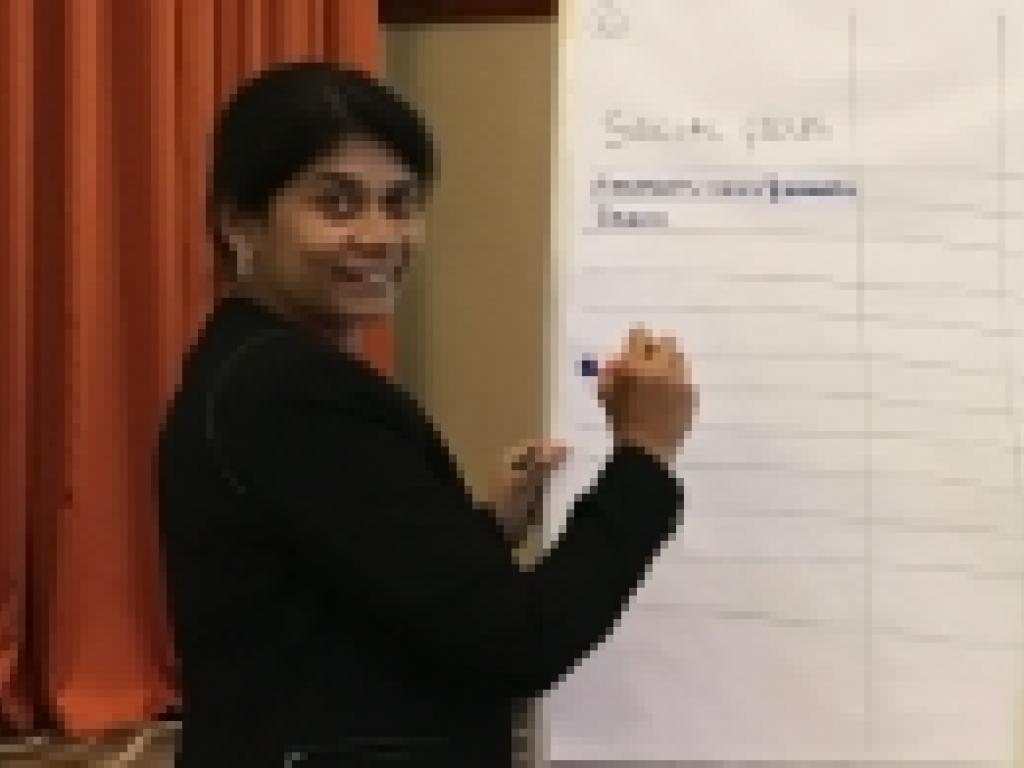
By Bhavana Rao, Watershed Organisation Trust
Bhavana Rao, a researcher and ASSAR focal point at the Watershed Organisation Trust (WOTR) in India, recently attended the ASSAR Botswana team's national Vulnerability and Risk Assessment (VRA) training workshop in Gaborone, as a recipient of an ASSAR Small Opportunities Grant. The aim of her visit was to develop a better understanding of Oxfam's VRA methodology and explore how it could be used to complement and strengthen WOTR's CoDriVE (Community Driven Vulnerability Evaluation) methodology for research evidence. Here she reports back on her cross-learning experience.
I’m not much of a blog writer, so don't blame me if this reads like a back-to-office report that I tweaked a bit! But what I write, is coming straight from my heart.
As the IDRC's Georgina Cundill retweeted, this is what it's all about. ASSAR Botswana's VRA training and workshop for integrating vulnerability and risk assessment into development planning was truly a hit and a wonderful experience.
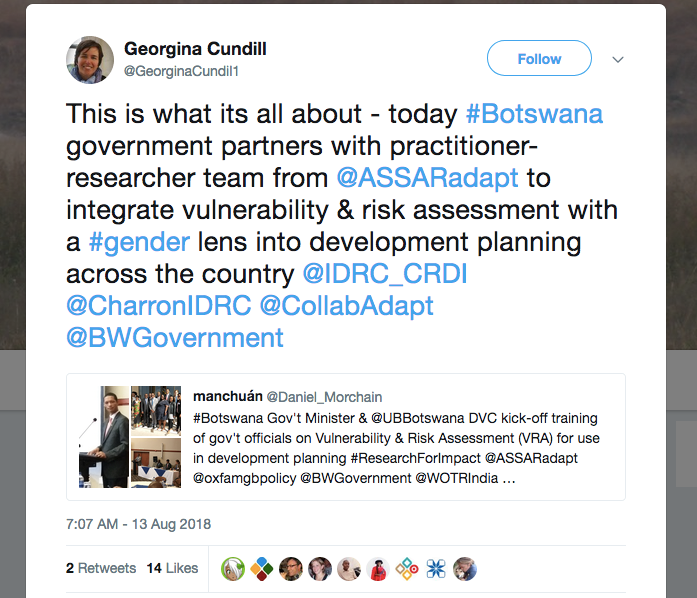
Why? Well, there were a number of reasons. Firstly, I was amazed at the "gender imbalance", as Prof Hillary Masundire pointed out on a lighter note during one of our debriefing sessions. The training witnessed 22 women officers out of 35 participants, whereas the workshop saw 39 women out of 67 participants – something I had never seen before! However, the flip side was that the men held more important and higher positions than the women, as they were from the central government offices, while the women made up the main work force at district-level government. Nevertheless, the numbers were impressive!
The diversity of stakeholders was also astonishing: we had representatives from the whole of Botswana in one room i.e. representing 10 districts and six urban centres of the country. Right from government ministers (particularly from the Presidential Affairs and Local Governance departments) and directors and deputy directors of the Rural Development Department, to district-level officers and economic planners. This was not all: on Day 3 and Day 4 of the workshop, local stakeholders joined these government officers – a diversity of traders, farmers, small vendors, farmer cooperatives and civil society organisations.
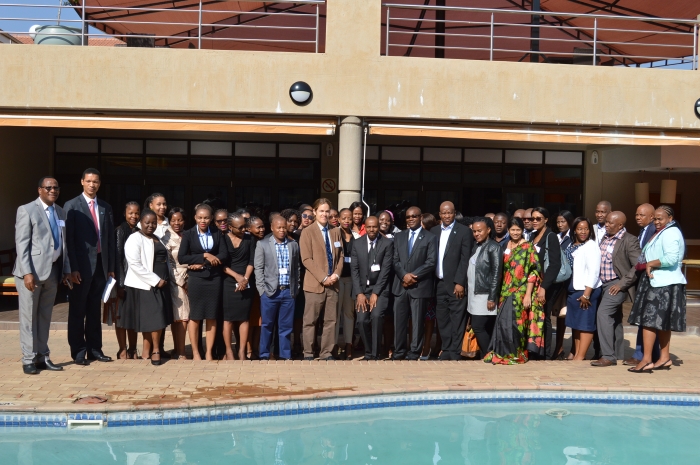
We had a tough time organising ourselves for the group photo.
Element of scale
A striking feature of the event was the element of scale. Not only did we train personnel from across the country in one shot, we also managed to generate valuable information during the training-cum-workshop, which provides the University of Botswana team with concrete leads to future research and potential collaborations from across the country.
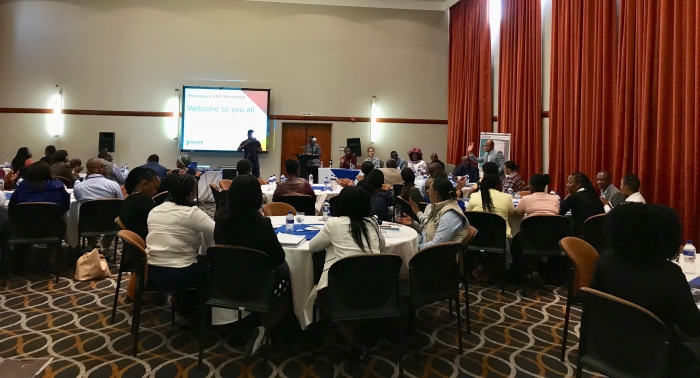
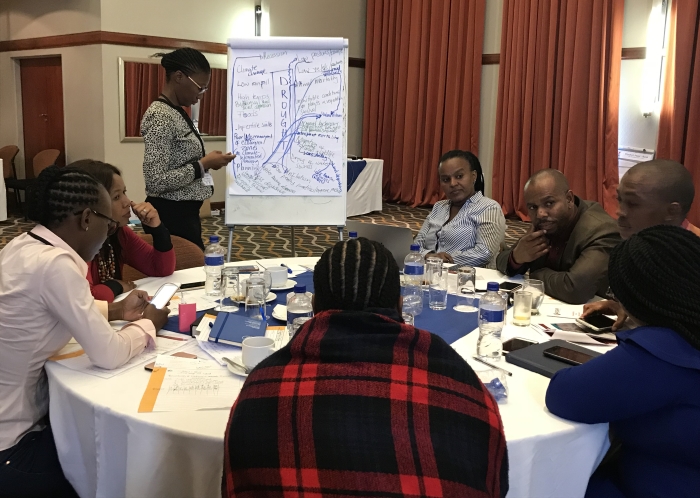
A diverse group of stakeholders attended the national VRA training workshop.
The amount of time and work the ASSAR University of Botswana (UB) team invested in the stakeholder mapping exercise was very commendable – it's a critical step towards organising such an event. What I personally felt and could see, was that academic institutions carry certain weight and credibility that general citizens, government officers and policy makers look up to.
The effort of the UB team to step out of their usual academic setting to engage with a diverse set of stakeholders actually showed results! This event was a true example of how interactive stakeholder-planning tools (VRA) can be used to build new bridges, pathways for more effective collaboration and, last but not the least, a future research agenda that is essential for the country’s development trajectory.
The design of the workshop caught my attention and is worth mentioning. The first two days revolved around teaching the VRA methodology to the participants, who then became facilitators in the stakeholder workshop in the following two days. This strategy gave the participants first-hand experience on the application of the tool with local stakeholders. This approach not only cleared doubts but also improved the participants' ability to use the tool.
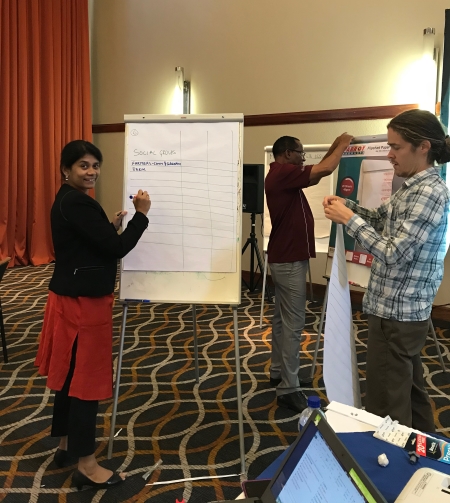
I was taking most of photographs, so here is proof that I was at the workshop too!
Mainstreaming the VRA tool
Further to this, the element of 'mainstreaming' was built into the event – the UB team identified the right participants for the VRA. The VRA training was specifically given to key officers in the government who are involved in district-level and country-level development planning for Botswana. The cadres were economic planners and district officer development from both rural and urban settings. Additionally, officers from the central government key departments were also there. The strategy of choosing the right cadre for the training-cum-workshop played an important role in getting the tool to be automatically mainstreamed. This was also evident in the feedback from some of the officers, who said: now that they know how to use such a tool and its benefits, they can use it in their annual planning.
Here are a few insights that caught my attention during the 'expectations' and 'reflections' sessions:
- Many officers did not limit themselves to learning a new tool; they also mentioned the need for realistic planning and finding ways of mainstreaming such tools. It was interesting to note how many officers felt that the government programmes did not provide everything that the communities needed, and that there was a lot of scope for improvement – hence the need and interest in tools such as the VRA.
- Towards the end of Day 2 of the training, the reflections by the same group of officers was heartening – many confessed that had they known that such a tool existed, the planning processes they already completed, could have been done so much better.
- Some officers from the central government units shared that this workshop and the VRA method helped them recognise existing gaps in central-level planning. According to them, the use of VRA for multi- stakeholder engagement is key as it facilitates inter-sectoral engagement and improves communication across units vertically.
- The participants expressed their desire for this process (of multi-stakeholder learning and engagement for appropriate planning) to continue so that the use of such tools and processes can be internalised and mainstreamed – it should not just end with a once-off training-cum-workshop event.
- Despite the benefits of such tools and processes, multi-stakeholder engagement is often seen as a difficult and time-intensive process and has almost always been donor- or programme-driven. It would be great if each institution could sit down and reflect on the need to combine research and practitioner work. It could be a key strategy for achieving long-term adaptation, since practitioner tools are good vehicles for the exchange of information between relevant stakeholders, who often cannot meet but are required to collaborate for effective planning.
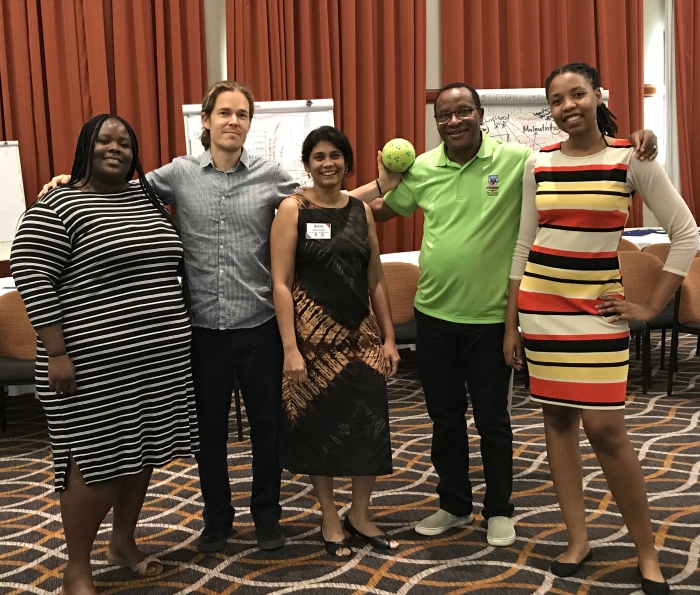
Team VRA – notice the glow! Chandapiwa Molefe, Daniel Morchain, Bhavana Rao, Hillary Masundire and Mmakwena Moesi.
Overall, it was a wonderful learning experience. If it weren't for the SOG grants in ASSAR, such cross-learning and exposure would not have been possible.